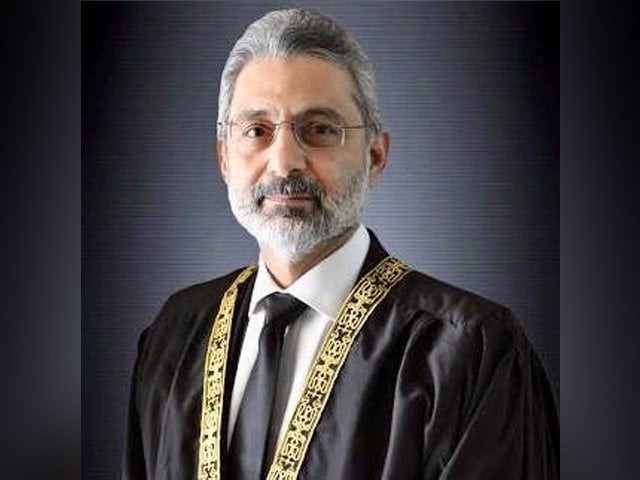Isa writes dissenting note to SC’s Feb 11 order
Raises 20 objections to the judgment barring him from hearing cases related to Prime Minister Imran Khan

Justice Qazi Faez Isa has raised 20 objections to the Supreme Court’s February 11 judgment barring him from hearing cases related to Prime Minister Imran Khan “to uphold the principle of un-biasness and impartiality”.
Presiding over a five-judge larger bench also including Justice Isa, Chief Justice of Pakistan Gulzar Ahmed on February 11 disposed of a case initiated on basis of a new report and opinion piece about Prime Minister Imran Khan’s alleged plan to issue development funds to lawmakers.
The judgment authored by CJ Gulzar said that since Justice Isa had already filed a petition against the Prime Minister Imran Khan in his personal capacity, “it would be in the interest of justice that the honourable judge should not hear matters involving the prime minister of Pakistan.”
Issuing a 28-page dissenting note to the verdict on Saturday, Justice Isa stated that the verdict has undermined the judiciary and the Supreme Court and “the court order and the events leading up to it suffer from the improprieties and illegalities”.
He noted that without informing the division bench, which had taken notice of news about PM Imran’s plan to issue development funds, the chief justice decided to reconstitute and expand the bench while excluding Justice Maqbool Baqar, who was part of the first bench along with Justice Isa.
Justice Isa stated that no one had accused the earlier bench of biasness or partiality but without consulting the bench, the chief justice “tersely announced that a judge of the Supreme Court [Justice Isa] should not hear any case involving the prime minister.”
“The hon’ble chief justice arbitrarily introduced a nonissue bias and lack of impartiality on the part of a judge on the bench,” he added.
Justice Isa said he was also not made privy to the February 11 written order and that the order was sent to a junior judge, bypassing him.
“The ‘Order of the Court’ was not written and thus, not signed, therefore, there is no ‘Order of the Court’ and the matter remains pending,” he stated, adding that the order was uploaded on the Supreme Court website before he saw it, let alone had the opportunity to agree or disagree with it.
“The order and the case file were not sent, in accordance with long-standing established practice, to the said judge [Isa] and the said judge learnt of the order through the media,” Justice Isa wrote, underscoring that he had to later write to the registrar to seek the order and the case file.
Also read: Supreme Court restrains Justice Isa from hearing PM’s cases
The justice further stressed that Paragraph 6 of the order is unconstitutional as it was not passed under any of the different jurisdictions of the Supreme Court stipulated in the Constitution. “Paragraph 6 of the order does not constitute a legal order as per law and as per the precedents of this court.”
Raising further objections, he said the Paragraph 6 does not constitute a decision in terms of Article 189 of the Constitution and contravenes the precedents of several larger benches of the court, holding that only the concerned judge can decide if he should hear a case or not.
Justice Isa said Paragraph 6 is contrary to both the settled jurisprudence and the Islamic principles and jurisprudence. He argued that the paragraph also contravenes the oath of judges.
“Prime Minister Imran Khan’s reported statement said money from the public purse would be disbursed for apparent political patronage at a time when the Senate elections were on the horizon, therefore, notice was issued by the two-member bench…
“However without a proper determination, and without ascertainment of the veracity and effect of the documents, the matter was abruptly disposed of,” Justice Isa said, adding that the Paragraph 6 undermines the judiciary and the Supreme Court.
"What commenced as an attempt to prevent corrupt practices and bribery ended with a judge being rebuked and restrained,” Justice Isa said.
Regarding prime minister’s immunity under Article 248 of Constitution, Justice Isa said the SC has held that only actions in accordance with the Constitution and the law have constitutional protection.
“There is no constitutional protection if an office is misused for personal or political gain, enriching friends, taking bribes or resorting to other corrupt practices, including diverting public funds to buy or influence legislators to vote for particular candidates.”
The apex court judge, who is in line to become the chief justice of Pakistan in September 2023, said the February 11 verdict disturbed him to such a degree that he even contemplated resignation.
“But then I remembered that this is not about a judge and his mistreatment. It is about something far more important; the Constitution, the peoples’ rights and their monies. All of which I have, with Almighty Allah’s help and grace, endeavored to protect and will (insha’Allah) continue to do so."
"In conclusion, I must say that it has been extremely painful for me to write this order. I apologize if anything herein has hurt or offended as that has not been my intention. I have said what I felt I needed to say in the hope that unstructured discretion is curtailed.
“To end on a positive note, the most resilient and finest institutions are those wherein there is candor, transparency and legitimate dissent. The court stands against all manner of constitutional violations and safeguards the people against misuse of power," Justice Isa noted.



















COMMENTS
Comments are moderated and generally will be posted if they are on-topic and not abusive.
For more information, please see our Comments FAQ